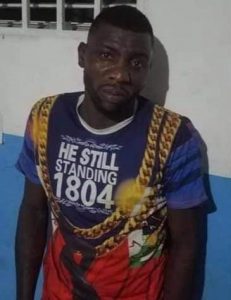LGBT+ community mourns a transphobic murder in Haiti
Colin Stewart is a 45-year journalism veteran living in Southern…
Amid the persistent violence that plagues Haiti, a killing on Oct. 17 stands out. The victim was a transgender policeman.

On Oct. 17, the Haitian LGBT+ community mourned yet another transphobic murder; the victim was Mickerlange François, a transgender policeman. The slaying occurred one week after the Oct. 9 death of celebrity makeup artist Maïkadou and in the same month as six unexplained disappearances within the LGBT+ community.

After the policeman’s death, investigators focused on the community and barraged LGBT+ Haitians with excessive questions about the victim, , according to Midou Blonski (pseudonym), a leader of the Haitian advocacy group FACSDIS (Femme en Action contre la Stigmatisation et la Discrimination Sexuelle/Women Taking Action Against Sexual Stigmatization and Discrimination).
This is a translated and edited account of a telephone interview of Blonski by advocacy journalist Moïse Manoel:
What is the political and social context surrounding this latest transphobic murder?
In Haiti, it has always been difficult for LGBT+ organizations to work with police and law enforcement, as with any form of public or governmental institution.
Firstly, there is the tendency to systematically minimize the homophobic or transphobic dimension of the crime. This goes along with the fact that homosexuality and transgender identity are taboo. For example, when Maïkadou died, few people discussed his sexual orientation.
Secondly, Haitian justice is, as a rule, a slow process, which becomes even slower when it comes to hate crimes having to do with sexual orientation. This is just my sense. For example, [LGBT+ rights activist] Charlot Jeudy died on Nov. 25, 2019, but to this date the results of the autopsy have not been divulged.
Haitian justice is truly tortoise-like.
What were the circumstances of this murder?

The alleged murderer, 28-year-old Obenson Saindor, shot policeman Mickerlange François in a Pétionville nightclub on Oct. 17.
Passion and jealousy were motives , as the victim had engaged in a romantic relationship with the alleged murderer’s partner. The alleged murderer had already threatened Mickerlange’s life while telling him to stay away from his household. Unfortunately, the victim did not take these threats seriously.
The alleged murderer was apprehended with the victim’s police service weapon, a 9mm caliber revolver. Obenson was also in possession of a second revolver, which investigators said could have been used to commit the crime.
What do you think of the situation, personally?
The alleged murderer knew the policeman was a trans man. The fact that Mickerlange died because of his gender identity disgusts me.
In addition, for me, this affair illustrates the way women are treated in Haiti. They are not respected and are seen as objects. Consequently, one can kill a rival, even a trans man, as one pleases. Women are seen as property, for one’s exclusive benefit.
This homicide illustrates anew the negation of feminine desire and aspirations. Because she loved someone else, he must be killed—without reflecting on what isn’t working between the original couple. That’s the problem.
We remain in a patriarchal society where women’s desires are ignored. This mentality leads only to submission or death.
How has the murder affected people?
This affair didn’t hit major headlines. All we know is that the alleged assassin was caught in the south, in Cavaillon, in the Cayes region.
Within the LGBT+ community, the murder caused a stir because it added to a long list of deaths and disappearances.
In national public opinion, however, these crimes had already been judged insignificant, despite their frequency.
At the organizational level, do you try to prevent this type of murder?
We already advocate for women’s rights. We fight for the right to equal justice for LGBT cases. Sadly, we see that this is still not enough.
Related articles:
- Haiti: A year later, a cry for justice for LGBTI activist Charlot Jeudy (December 2020, 76crimes.com)
- Haiti: Violence keeps raging a year after Charlot Jeudy’s death (
- Haiti: A demand for justice for fallen LGBTI leader Charlot Jeudy (
- Emotional appeal to keep Haitian trans people safe (
- Haiti: Why no probe of the suspicious death of LGBTQ activist Charlot Jeudy? (
- Haiti: Activists demand probe of sudden death of LGBTQ rights defender (




